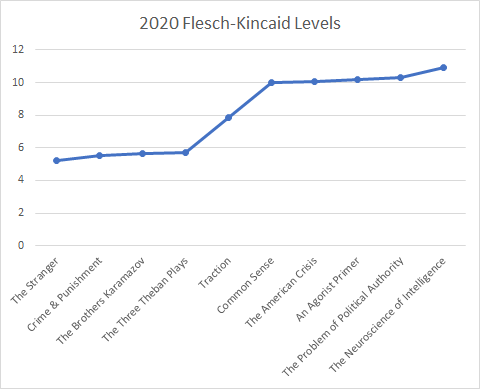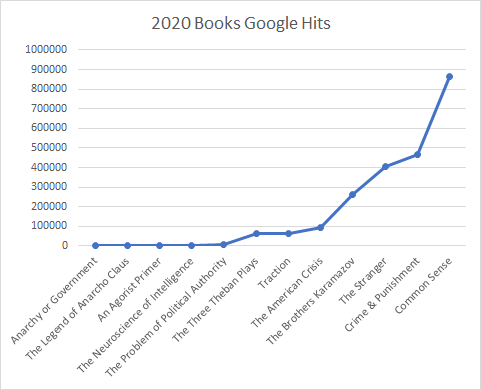Table of Contents #
The Books #
In reading order, the books that I read during 2020 were as follows:
| Author | Title |
|---|---|
| Gino Wickman | Traction |
| Richard J. Haier | The Neuroscience of Intelligence |
| Samuel Edward Konkin III | An Agorist Primer |
| Samuel Edward Konkin III | The Legend of Anarcho Claus |
| Albert Camus | The Stranger |
| Michael Huemer | The Problem of Political Authority |
| Sophocles | The Three Theban Plays |
| William Mackintire Salter | Anarchy or Government |
| Fyodor Dostoevsky | Crime & Punishment |
| Thomas Paine | Common Sense |
| Thomas Paine | The American Crisis |
| Fyodor Dostoevsky | The Brothers Karamazov |
Analysis #
For the books I read in 2019 I looked at genre, flesch-kincaid reading grade, and an index of their popularity vis-a-vis the google search engine at the time. This year I will continue with most of the same analysis, although I am dropping the inclusion of genre.
Genre #
This year I’ve decided to drop the genre categorization due to an inability to meaningfully reflect the content of a book with a short genre tag. The best example of this from the books I read in 2020 comes from Thomas Paine’s The American Crisis essays. These essays were written during the American Revolutionary War and could arguably be classified as history (a primary source from that era) or political non-fiction (Paine does not have kind things to say about the British government at that time). Since these two genres imply vastly different types of books in my mind, I’m abolishing the category until I can find a more definitive categorization method.
Flesch-Kincaid #
Per Wikipedia, the Flesch-Kincaid grade level presents a score as a U.S. grade level to make it easy to judge the readability level of various books and texts.
This grade can be generated in R with the koRpus package function flesch.kincaid. This is easiest to do if you can load the files in as a text file, or PDF (using the pdftools package function pdf_text). The results of running this on 10 of my 12 books is as reflected in the line chart below. For two of the books I was unable to source digital versions to perform analysis on.

Note that these scores may differ from other officially published metrics due to front or back matter (translations, version information, etc) that I did not filter out.
Google Score #
To assess the popularity of each book I googled the term “Book title” “Author name” for each of my 2020 books. I recorded the number of hits as of December 30th, 2020. Although the inclusion of the author is meant to filter out false positives (results where a book title appears without a reference to the book of that name), there is still a large chance that books like “Common Sense” have inflated result numbers from collisions that reference both the author and the use of common sense.

